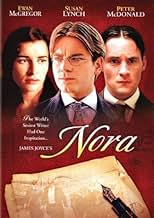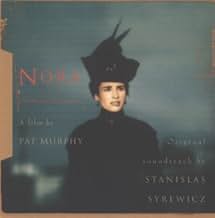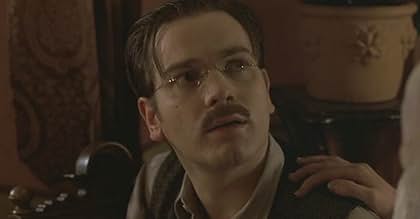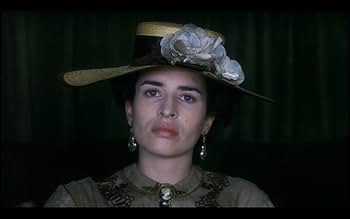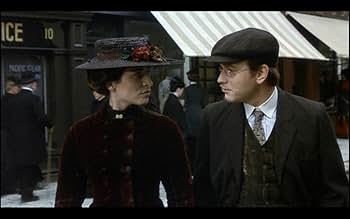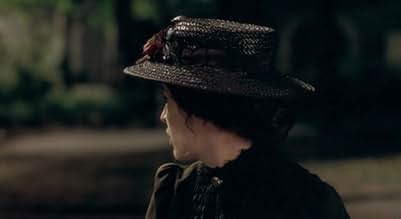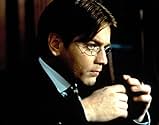PUNTUACIÓN EN IMDb
5,9/10
1,9 mil
TU PUNTUACIÓN
Añade un argumento en tu idiomaDublin, 1904, James Joyce chats up Nora Barnacle, a hotel maid recently come from Galway. She enchants him with her frank, uninhibited manner, and before long, he's convinced her to come wit... Leer todoDublin, 1904, James Joyce chats up Nora Barnacle, a hotel maid recently come from Galway. She enchants him with her frank, uninhibited manner, and before long, he's convinced her to come with him to Trieste.Dublin, 1904, James Joyce chats up Nora Barnacle, a hotel maid recently come from Galway. She enchants him with her frank, uninhibited manner, and before long, he's convinced her to come with him to Trieste.
- Dirección
- Guión
- Reparto principal
- Premios
- 3 premios y 7 nominaciones en total
Vinnie McCabe
- Uncle Tommy
- (as Vincent McCabe)
Reseñas destacadas
It will not be difficult to find large numbers of enthusiasts in the literature departments of your local university who will state under oath that James Joyce was one of the greatest creative geniuses in human history. Something about his biography can for instance be found in the books by Richard Ellman or Fritz Senn, two Joyce specialists who devoted their lives to the study of his work. His work is not dull, as some commentators here were suspecting, but it's also not a collection of one-liners. Actually, it's hard to find more challenging mind-bogglers that are also considered literary classics than some of Joyce's work. I must say that for those who hoped to learn something about 'James', 'Nora' has as much to offer as 'Bilitis' about Einstein. If you forget about the names of the protagonists in this film, it goes through as a somewhat entertaining writer-lover romance. But to honestly attribute Joyce's name to this semi-sofporn is quite off the mark. And as to the question on my title line, the answer is: I honestly don't know.
I bought this DVD, expecting the always fascinating work of Ewan Mcgregor. When I watched it, I was interested in the characters, wanting to know more. By the end of the film I was disappointed in the story line. They were together, then they weren't. He couldn't live with out her and all is happy again. It was two people that were the perfect couple but were absolutely horrible for each other. I did like the fact that it ended with a laugh, though.
Writer's lives are always a difficult subject for the screen, and even with the wealth of biographical and autobiographical material about James Joyce, he remains no exception. This movie, concentrating on the early part of his relationship with the humorously-monikered Nora barnacle makes a reasonable enough attempt to bring cinematic life to this complex and enigmatic figure.
Ewan McGregor, in the role of Joyce is sometimes a bit too young and sexy to convey his subjects brooding, promethean intensity, but he's certainly more convincing than Bosco Hogan in Joseph Strick's Portrait of an artist. The real star of the film is Susan Lynch, whose earthy sexuality convinces us that she could develop into the Molly Bloom of Ulysses. There's also good support from the actor playing Joyce's more level-headed brother and soi-disant "keeper", Stanislaus.
The movie is often affected by the exaggerated Irishness that seems to blight every movie set in the island, but it doesn't get in the way of the film's verisimilitude too much, with one exception. When Joyce's brother takes his book to an Irish publisher, he is told that "there's something dirty going on" in "The Dead" and this is presented as a uniquely Irish reaction, though in reality Joyce had the same reaction everywhere.
The film is also punctuated by subtle allusions to Joyces work that literati will enjoy picking up, but won't alienate those poor hordes of non-Joyceans too much. At the risk of sounding like a swotty pedant, there's a lot of profane language in the movie, which Joyce maintained he never used in speech, though it serves, if anything to increase the characters' believability.
Ewan McGregor, in the role of Joyce is sometimes a bit too young and sexy to convey his subjects brooding, promethean intensity, but he's certainly more convincing than Bosco Hogan in Joseph Strick's Portrait of an artist. The real star of the film is Susan Lynch, whose earthy sexuality convinces us that she could develop into the Molly Bloom of Ulysses. There's also good support from the actor playing Joyce's more level-headed brother and soi-disant "keeper", Stanislaus.
The movie is often affected by the exaggerated Irishness that seems to blight every movie set in the island, but it doesn't get in the way of the film's verisimilitude too much, with one exception. When Joyce's brother takes his book to an Irish publisher, he is told that "there's something dirty going on" in "The Dead" and this is presented as a uniquely Irish reaction, though in reality Joyce had the same reaction everywhere.
The film is also punctuated by subtle allusions to Joyces work that literati will enjoy picking up, but won't alienate those poor hordes of non-Joyceans too much. At the risk of sounding like a swotty pedant, there's a lot of profane language in the movie, which Joyce maintained he never used in speech, though it serves, if anything to increase the characters' believability.
I've read the biography on which this movie is based, and found that the screen adaptation hasn't embellished the true story (unlike most biopics) very much. "Nora" covers the Joyces courtship in Dublin, immigration, and their years in Trieste until 1914 when "Dubliners" was finally published. McGregor may not be perfectly cast - he's heavier, and not much of a tenor - Joyce, on the other hand, was so renowned for his singing that he briefly contemplated making a career out of it. Ewan's very earnest in his attempt, though, he gets an A for effort. Susan Lynch makes a great Nora, no complaints there.
Some of the chronology is played around with - the Prezioso episode happened after James and Nora's last mutual visit to Galway, not before. Two of Joyce's sisters are conflated into one, and the family's stint in Rome is omitted. Some episodes are invented for the sake of exposition, such as the run-in with the cattle in Dublin. Those are minor quibbles. The film got many details right - not the least of which was how elegantly the couple always tried to dress despite their relative lack of funds. Trieste hasn't changed much since early 20th century, so we also get to see some nice location shots - and a few in Dublin.
I was a bit disappointed that the film ended at an early cutoff point, after James and Nora's first decade together. Ideally, it should have been a miniseries a la "John Adams", and covered their fame in Paris, Nora and the kids caught in a Civil War crossfire during their last trip to Ireland, Joyce's eye troubles, Lucia's illness, etc. As is, it shows only the beginning of an almost 40-year relationship.
Some of the chronology is played around with - the Prezioso episode happened after James and Nora's last mutual visit to Galway, not before. Two of Joyce's sisters are conflated into one, and the family's stint in Rome is omitted. Some episodes are invented for the sake of exposition, such as the run-in with the cattle in Dublin. Those are minor quibbles. The film got many details right - not the least of which was how elegantly the couple always tried to dress despite their relative lack of funds. Trieste hasn't changed much since early 20th century, so we also get to see some nice location shots - and a few in Dublin.
I was a bit disappointed that the film ended at an early cutoff point, after James and Nora's first decade together. Ideally, it should have been a miniseries a la "John Adams", and covered their fame in Paris, Nora and the kids caught in a Civil War crossfire during their last trip to Ireland, Joyce's eye troubles, Lucia's illness, etc. As is, it shows only the beginning of an almost 40-year relationship.
I was lucky enough to see this at a small time premiere in Sydney and Ewan turned up as he is out here making some big time sci-fi movie. Anyway my first reaction to this movie was that I thought that it moved with a pace that was too disjointed and that we were confronted with too much intimate detail before we had a chance to understand anything about the characters. Afterwards we heard from Ewan and from his expressions of how it was a glimpse at a life not a tale and how that we are supposed to just capture moments in what was a very complex and unique relationship that Joyce had with nora that on further thought I have come to see more into what the film was trying to do so on second viewing I was able to understand I suppose more of the workings of the mind that was Joyce I highly recommend this film to anyone with a passion not only for Joyce's work but anyone who has an interest in the personal life of a creative mind. Watch it twice for even more.
¿Sabías que...?
- CuriosidadesIt took around four years for producer Ewan McGregor to get this film to the screen.
- Créditos adicionales'Dubliners' was finally published in 1914. James Joyce is recognised as one of the world's great writers. He and Nora spent the rest of their lives together.
- ConexionesFeatures Rory O'More (1911)
- Banda sonoraShe is From the Land
Performed by Ewan McGregor
Selecciones populares
Inicia sesión para calificar y añadir a tu lista para recibir recomendaciones personalizadas
- How long is Nora?Con tecnología de Alexa
Detalles
Taquilla
- Recaudación en Estados Unidos y Canadá
- 15.120 US$
- Fin de semana de estreno en EE. UU. y Canadá
- 12.297 US$
- 6 may 2001
- Recaudación en todo el mundo
- 15.120 US$
- Duración1 hora 46 minutos
- Color
- Mezcla de sonido
- Relación de aspecto
- 1.85 : 1
Contribuir a esta página
Sugerir un cambio o añadir el contenido que falta


